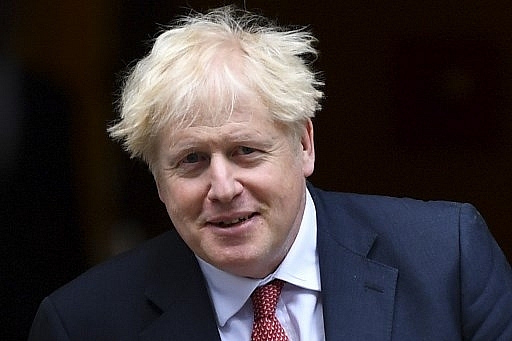UK PM gives October 15 deadline for Brexit deal
 |
| Britain's Prime Minister Boris Johnson leaves 10 Downing Street on September 2, 2020, to attend Prime Minister's Questions (PMQs) at the House of Commons in central London for the first time since the summer recess. The UK Parliament returned to work on September 1 with the governing Conservative Party having taking a summer of hits in the polls bringing them level with the main opposition Labour Party amid a series of embarrassing U-turns and economic devastation wrought by the coronavirus pandemic.(photo: DANIEL LEAL-OLIVAS / AFP) |
The eighth round of negotiations resume in London this week, with both sides talking increasingly tough, amid accusations of intransigence and political brinkmanship.
The UK's chief negotiator, David Frost, did little to raise expectations about a breakthrough, promising no compromise on London's red lines, in a rare newspaper interview published on Sunday.
His EU opposite number, Michel Barnier, this week said the talks stood or failed on the need to get an accord on EU access to UK fishing waters and state aid rules, but Britain was giving no ground.
Brussels has already indicated that mid-October was the latest a deal could be struck, given the need for translation and ratification by the European Parliament.
Despite months of refusing to confirm a firm cut-off date, Johnson agreed.
"There needs to be an agreement with our European friends by the time of the European Council on October 15 if it's going to be in force by the end of the year," he said in remarks released by his office.
"So, there is no sense in thinking beyond that point. If we can't agree by then, then I do not see that there will be a free trade agreement between us."
Should that happen, Britain will have an "Australia-style" deal with the EU or one similar to that agreed with Canada and other countries, he said.
Australia trades with the EU under World Trade Organization rules and tariffs. But Johnson, whose government had said it wanted a "zero tariff, zero quota" regime, insisted it would still be a "good outcome" for Britain.
- Door open -
Johnson's warning will likely compound criticisms from British pro-EU "remainers" that his ruling Conservative government envisaged a "no-deal" scenario all along, despite claiming the contrary.
"Brexiteers" had promised that securing a deal with Britain's biggest trading partner would be straightforward and rejected criticism that unravelling nearly 50 years of ties with Europe would be lengthy and even impossible.
Britain formally left the 27-member bloc on January 31 -- nearly four years after a divisive referendum that crippled the country politically and saw two prime ministers resign.
Johnson, who took over after Theresa May repeatedly failed to get her Brexit divorce deal through parliament, promised Britain's borders and ports will be ready for when the so-called transition period comes to an end on December 31.
Meanwhile, media reports said Johnson was also planning new UK legislation that would override parts of the withdrawal agreement made with the EU last year and ratified in January.
According to The Financial Times, which cited three people close to the plans, the bill would undermine agreements relating to Northern Ireland customs and state aid.
A government spokesperson told the newspaper it was "working hard to resolve outstanding issues" with the Northern Ireland protocol, which was negotiated as part of the deal in order to keep the Irish border open.
- 'Full control' -
Britain remains bound by EU rules while it tries to thrash out new terms of its relationship.
The talks, which were on a tight timetable even before disruption caused by the coronavirus outbreak, have stalled, notably because of wrangling over fishing rights and fair competition rules.
Johnson did not rule out a deal altogether and vowed to work hard this month to achieve one. But he pledged Britain "will be ready" if talks break down.
"We will have full control over our laws, our rules, and our fishing waters," he promised.
"We will have the freedom to do trade deals with every country in the world. And we will prosper mightily as a result.
"We will of course always be ready to talk to our EU friends even in these circumstances.
"Our door will never be closed and we will trade as friends and partners –- but without a free-trade agreement."
What the stars mean:
★ Poor ★ ★ Promising ★★★ Good ★★★★ Very good ★★★★★ Exceptional
Related Contents
Latest News
More News
- France supports Vietnam’s growing role in international arena: French Ambassador (January 25, 2026 | 10:11)
- Foreign leaders extend congratulations to Party General Secretary To Lam (January 25, 2026 | 10:01)
- Russian President congratulates Vietnamese Party leader during phone talks (January 25, 2026 | 09:58)
- Worldwide congratulations underscore confidence in Vietnam’s 14th Party Congress (January 23, 2026 | 09:02)
- Political parties, organisations, int’l friends send congratulations to 14th National Party Congress (January 22, 2026 | 09:33)
- 14th National Party Congress: Japanese media highlight Vietnam’s growth targets (January 21, 2026 | 09:46)
- 14th National Party Congress: Driving force for Vietnam to continue renewal, innovation, breakthroughs (January 21, 2026 | 09:42)
- Vietnam remains spiritual support for progressive forces: Colombian party leader (January 21, 2026 | 08:00)
- Int'l media provides large coverage of 14th National Party Congress's first working day (January 20, 2026 | 09:09)
- Vietnamese firms win top honours at ASEAN Digital Awards (January 16, 2026 | 16:45)

 Tag:
Tag:




















 Mobile Version
Mobile Version